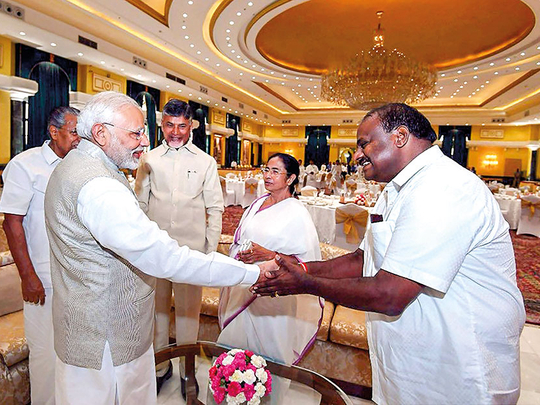
New Delhi: Indian Prime Minister Narendra Modi on Sunday called upon chief ministers to contribute their efforts towards 100 per cent implementation of Central schemes for the poor people’s welfare as he said these were no longer limited to certain people and reaching everyone without discrimination.
He encouraged states to give fresh ideas to the Finance Commission on outcome-based allocations and expenditure correction, while calling for a widespread debate and consultations on simultaneous parliamentary and assembly elections, “keeping in view various aspects such as the resulting financial savings and consequent better utilisation of resources”.
In his closing remarks at fourth meeting of the NITI Aayog’s Governing Council, Modi, welcoming the constructive discussion and suggestions made by various Chief Ministers, assured them that these would be seriously considered during decision-making, an official statement said.
He asked the NITI Aayog to follow up, within three months, on the actionable points suggested by states.
Modi termed it “vital to identify the ‘last people in the line’ so that benefits of governance can reach them”. “Similarly social justice is an important governance objective. These noble causes require close coordination and constant monitoring,” he said.
On his government’s guiding principle of “Sabka Saath, Sabka Vikas”, the Prime Minister said: “The schemes of the Union government are no longer limited to certain people, or to certain regions and are reaching everyone without discrimination, in a balanced way.”
Noting that all villages of the country are now electrified, he said that, under Saubhagya Yojana, four crore houses are now being provided with electricity connections.
“Rural sanitation coverage has increased from less than 40 per cent to about 85 per cent in four years. After implementation of the Jan Dhan Yojana, the entire population will be connected to the banking system.
“The Ujjwala Yojana is providing access to cooking gas, and Mission Indradhanush is working towards universal immunisation,” he said adding that his government is working towards providing housing for all by 2022.
“The implementation of these welfare schemes is also bringing about a behavioural change in the lives of people,” he said, holding that the neem coating of urea, Ujjwala Yojana, Jan Dhan Accounts and RuPay debit cards are improving the lives of the people, while the Swachh Bharat Mission is being discussed around the world.
“In the last four years, 77 million toilets have been constructed,” he said calling upon the Chief Ministers to work towards 100 per cent sanitation coverage by October 2, 2019, the 150th birth anniversary of Mahatma Gandhi.
He reiterated the his commitment to provide universal coverage of seven key schemes to 45,000 additional villages in 115 Aspirational Districts, by August 15.
On the issue of environment, raised by some Chief Ministers, the Prime Minister urged them to use LED bulbs in government buildings, official residences and street lights “within a definite time frame”.
Modi appreciated several other suggestions made by various Chief Ministers, on matters such as water conservation, agriculture, rural job scheme etc.
He also called upon Chief Ministers of Madhya Pradesh, Bihar, Sikkim, Gujarat, Uttar Pradesh, West Bengal and Andhra Pradesh, to work together to make recommendations on a coordinated policy approach on the subjects of agriculture and the rural job scheme, including both pre-sowing, and post-harvest phases.












